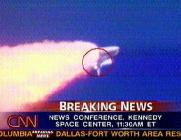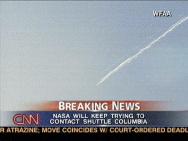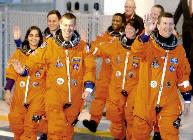CNN reported on February 1, 2003 that space shuttle Columbia exploded in the space above Texas. This news shocked the whole world. President Bush cut short his weekend at Camp David to return to the White House to meet with his chief of staff and top advisers. FBI agents and NASA Scientists went to Texas to investigate the tragedy.
Residents of North Texas said they saw flames and heard a window-rattling boom Saturday about the time the space shuttle Columbia apparently disintegrated on its way to a scheduled landing at Cape Canaveral.
"It was like a car hitting the house or an explosion. It shook that much," said John Ferolito, 60, of Carrolton, north of Dallas.
The Columbia was returning to Kennedy Space Center in Florida after a 16-day research mission when it broke up in flames about 200,000 feet over north-central Texas minutes before it was scheduled to land. NASA officials at the Johnson Space Center in Houston, Texas, said they last had contact with the craft about 9 a.m. EST.
Streaking through the atmosphere at 18 times the speed of sound, Columbia disintegrated Saturday morning about 15 minutes before its scheduled landing at the Kennedy Space Center in Florida.
A timeline of the final minutes of the shuttle flights and the hours following it (all times EST): at 8:15 a.m., space shuttle Columbia fires its braking rockets and streaks toward touchdown. At 8:53 a.m., ground controllers lose data from four temperature indicators on the inboard and outboard hydraulic systems on the left side of the spacecraft. The shuttle is functioning normally otherwise, so the crew is not alerted. At 8:56 a.m., sensors detect rise in temperature and pressure in tires on the shuttle's left-side landing gear. At 8:58 a.m., data is lost from three temperature sensors embedded in the shuttle's left wing. At 8:59 a.m., data is lost from tire temperature and pressure sensors on the shuttle's left side. One of the sensors alerts the crew, which is acknowledging the alert when communication is lost. At approximately 9 a.m., all vehicle data is lost. The shuttle is 207,135 feet over north-central Texas and is traveling about Mach 18.3. NASA officials try to re-establish communication for several minutes.
Texas and Louisiana residents report a loud noise and bright balls - shuttle debris -- in the sky.
"At this time we have no indication that the mishap was caused by anything or anyone on the ground," NASA Administrator Sean O'Keefe said in a news conference Saturday afternoon.
The Federal Emergency Management Agency, assisted by military forces from Fort Hood, Texas, have begun collecting debris from Columbia. People were urged not to go near the debris because it could contain toxic substances from the shuttle fuel.
To assist the recovery effort, the Federal Aviation Administration prohibited aircraft from flying below 3,000 feet in an area 160 miles long and 40 miles wide extending from Cedar Creek, Texas, to Fort Polk, Louisiana. The FAA also urged pilots and airlines to be alert to a debris cloud in the area -- 95 miles long and more than 22 miles wide -- that could create a "visibility issue" for pilots.
"Columbia's lost. There are no survivors," a grim-faced President Bush said in an address to the American people. "These astronauts knew the dangers, and they faced them willingly, knowing they had a high and noble purpose in life."
Bush ordered flags on federal buildings lowered to half-staff until Wednesday in honor of Columbia's crew, and many state governors followed suit.
"This day has brought terrible news and great sadness to our country," the president said during the address.
To the families of the astronauts, Bush said, "Our entire nation grieves with you," and he made it clear that the United States would continue with manned space flight, despite the risks.
"The cause in which they died will continue," he said. "Mankind is led into the darkness beyond our world by the inspiration of discovery and the longing to understand. Our journey will go on."
After naming the seven astronaut aboard the shuttle, Bush said, "These men and women assumed great risk in service to all humanity. In an age when space flight has come to seem almost routine, it is easy to overlook the dangers."
For their courage and idealism, "we will miss them all the more," he said.
"All Americans today are thinking as well of the families of these men and women," Bush said. "Our entire nation grieves with you. And those you loved will always have the respect and gratitude of this country."
http://www.cnn.com/2003/TECH/space/02/01/shuttle.columbia/index.html
http://www.cnn.com/2003/TECH/space/02/01/sprj.colu.tictoc/index.html
http://www.cnn.com/2003/US/02/01/security.shuttle/index.html
http://www.cnn.com/2003/US/02/01/sprj.colu.shuttle.bush/index.html
http://www.cnn.com/2003/US/02/01/shuttle.investigation/index.html
Category: Traditional Culture







